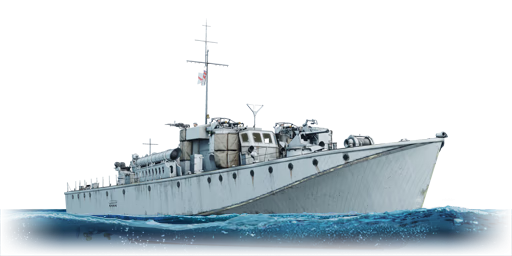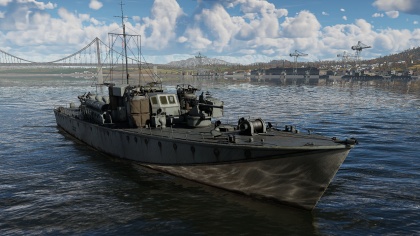Difference between revisions of "Fairmile D (617)"
(→Usage in battles) (Tag: Visual edit) |
(→Usage in battles) (Tag: Visual edit) |
||
| Line 40: | Line 40: | ||
== Usage in battles == | == Usage in battles == | ||
| − | + | In AB this boat works best when the opposing team has started using aircraft as the boat has good coverage from its secondary and anti-aircraft armaments and is used to provide anti-air cover (with HE rounds equippped) for other more powerful boats. However, given its speed and agility it is good when making breaks for neutralising or capturing points, especially if they are not being guarded by larger more heavily-armoured craft. The high fire rate and placement of the primary cannon means that it is easy to use and will handle craft of a similar size (plus there is no overheat mechanic). Against larger or more heavily-armoured targets the user should rely on the torpedoes or team mates (especially against craft such as the similary BR rated SF40) as the main cannon is too low caliber to end head-to-head conflicts quickly enough given the lighweight nature of the hull. Against smaller boats such as the Pr.123 or the ubiquitours LS3, it is best the use the secondary or anti-air armaments (especially when the target is within 1.5km) as they are sufficiently powerful to deal with their armour while being able to keep up with these agile craft but a few well place shots at longer ranges from the primary cannon can be very satisfying. As for most coastal British boats, this boat is not suited for areas of intense fighting and is best used as anti-air support or when used with hit and run tactics. | |
=== Modules === | === Modules === | ||
Revision as of 08:37, 8 November 2020
Contents
Description
The Fairmile D (617) is a rank III British motor torpedo boat
with a battle rating of 2.3 (AB/RB/SB). It was introduced in Update 1.83 "Masters of the Sea" as part of the British fleet closed beta test.
General info
Survivability and armour
Talk about the vehicle's armour. Note the most well-defended and most vulnerable zones, e.g. the ammo magazine. Evaluate the composition of components and assemblies responsible for movement and manoeuvrability. Evaluate the survivability of the primary and secondary armament separately. Don't forget to mention the size of the crew, which plays an important role in fleet mechanics. Tips for preserving survivability should be saved for the "Use in battle" section.
If necessary, use a graphic template to show the most well-protected or most vulnerable points in the armour.
Mobility
Write about the ship’s mobility. Evaluate its power and manoeuvrability, rudder rerouting speed, stopping speed at full tilt, with its maximum forward speed and reverse speed.
Armament
Primary armament
Provide information about the characteristics of the primary armament. Evaluate their efficacy in battle based on their reload speed, ballistics and the capacity of their shells.
Broadly describe the ammunition available for the primary armament, and provide recommendations on how to use it and which ammunition to choose.
Secondary armament
Some ships are fitted with weapons of various calibres. Secondary armament is defined by the weapon chosen with the control Select secondary weapon. Evaluate the secondary armament and give advice on how to use them. Describe the ammunition available for the secondary armament. Provide recommendations on how to use them and which ammunition to choose. Remember that anti-air armament, even heavy calibre weapons, belong in the next section.
Anti-aircraft armament
An important part of the ship’s armament responsible for air raid defense. Anti-aircraft armament is defined by the weapon chosen with the control Select anti-aircraft weapons. Talk about the ship’s anti-air cannons and machine guns, the number of guns and their positions, their effective range, and about their overall effectiveness – including against surface targets.
Torpedo armament
Many ships are armed with torpedo launchers, and for some vessels such as boats, torpedoes are an extremely important means of defeating an opponent. Evaluate the position of the torpedo launchers, discuss the ammunition available, firing specifics such as dead zones, features of the torpedoes themselves, etc.
Special armament
Depth charges, mines, rocket launchers and missiles are also effective in skilled hands and can be an unexpected surprise for an opponent. Evaluate the ammunition of this type of armament and rate its performance in combat.
Usage in battles
In AB this boat works best when the opposing team has started using aircraft as the boat has good coverage from its secondary and anti-aircraft armaments and is used to provide anti-air cover (with HE rounds equippped) for other more powerful boats. However, given its speed and agility it is good when making breaks for neutralising or capturing points, especially if they are not being guarded by larger more heavily-armoured craft. The high fire rate and placement of the primary cannon means that it is easy to use and will handle craft of a similar size (plus there is no overheat mechanic). Against larger or more heavily-armoured targets the user should rely on the torpedoes or team mates (especially against craft such as the similary BR rated SF40) as the main cannon is too low caliber to end head-to-head conflicts quickly enough given the lighweight nature of the hull. Against smaller boats such as the Pr.123 or the ubiquitours LS3, it is best the use the secondary or anti-air armaments (especially when the target is within 1.5km) as they are sufficiently powerful to deal with their armour while being able to keep up with these agile craft but a few well place shots at longer ranges from the primary cannon can be very satisfying. As for most coastal British boats, this boat is not suited for areas of intense fighting and is best used as anti-air support or when used with hit and run tactics.
Modules
| Tier | Seakeeping | Unsinkability | Firepower | |||
|---|---|---|---|---|---|---|
| I | Dry-Docking | Tool Set | 20 mm HE | Anti-Air Armament Targeting | ||
| II | Rudder Replacement | Fire Protection System | Smokescreen | 20 mm AP | Auxiliary Armament Targeting | |
| III | Propeller Replacement | Depth Charges | Primary Armament Targeting | Improved Rangefinder | ||
| IV | Engine Maintenance | New Pumps | Artillery Support | Torpedo Mode | ||
Pros and cons
Summarize and briefly evaluate the vehicle in terms of its characteristics and combat effectiveness. Mark its pros and cons in the bulleted list. Try not to use more than 6 points for each of the characteristics. Avoid using categorical definitions such as "bad", "good" and the like - they have a substitution in the form of softer "inadequate", "effective".
Pros:
- Reasonable anti-air
- Fast and agile
Cons:
- Light armour
History
Describe the history of the creation and combat usage of the ship in more detail than in the introduction. If the historical reference turns out to be too big, take it to a separate article, taking a link to an article about the vehicle and adding a block "/ History" (example: https://wiki.warthunder.com/(Vehicle-name)/History) and add a link to it here using the main template. Be sure to reference text and sources by using <ref>, as well as adding them at the end of the article.
Media
An excellent addition to the article will be video guides, as well as screenshots from the game and photos.
See also
- Fairmile D (601) - Sister ship that with 57 mm armaments replaced with automatic 40 mm cannons and no torpedoes.
- Fairmile D (697) - Sister ship that is slightly slower with a pair of Mk XV torpedoes.
- Fairmile D (5001) - Sister ship that is slightly slower with a pair of both Mk.VIII and Mk XV torpedoes.
External links
Paste links to sources and external resources, such as:
- topic on the official game forum;
- encyclopedia page on ship;
- other literature.
| Britain boats | |
|---|---|
| Motor torpedo boats | Brave Borderer · Dark Aggressor · Dark Aggressor TD · Fairmile D (617) · Fairmile D (697) · Fairmile D (5001) · HMS Gay Archer |
| MTB-1(1) · MTB-1(2) · MTB Vosper · MTB Vosper(2) · MTB-422 | |
| Motor gun boats | Dark Adventurer · Fairmile A (ML100) · Fairmile B (ML345) · Fairmile C (312) · Fairmile C (332) · Fairmile D (601) · Fairmile H LCS(L)(2) |
| HMAS Arrow · HMAS Fremantle · MGB-61 · MGB-75 · ML 1383 · SGB Grey Fox · SGB Grey Goose | |
| Gunboats | HMS Spey |





